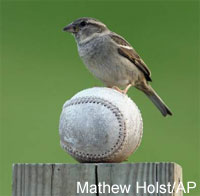 Sad news on the environmental front I read this morning: I had heard that the songbird population is declining, in no small part due to massive use of pesticides by modern mass-agriculture techniques, loss of habitat, and, I've heard, urban noise (drowning out the mating songs of birds) - but I had no idea that some species of birds have dropped off by over 70% over the last 40 years. Really shocking! Songbirds are important sources of bug control, and of course, are a beautiful addition to the background soundtrack of life. :)
Sad news on the environmental front I read this morning: I had heard that the songbird population is declining, in no small part due to massive use of pesticides by modern mass-agriculture techniques, loss of habitat, and, I've heard, urban noise (drowning out the mating songs of birds) - but I had no idea that some species of birds have dropped off by over 70% over the last 40 years. Really shocking! Songbirds are important sources of bug control, and of course, are a beautiful addition to the background soundtrack of life. :)While most of us don't run mega-farms, there are things you can do.
Choose gardens over backyard patios: The article I read today says that backyard patios replacing gardens has actually affected bird populations. So, if you do have a choice, choose to have a garden, to provide seeds and places for bugs to live. (Eg: we have a lot of Jerusalem Artichoke around the property, and bugs LOVE it! All types of bugs, none of which I could actually identify, none of which bite people (which is good) - they don't eat the plant, they just love to sit on it in the sun. It's like a bird smorgasbord!). Perennial gardens (plants that survive the winters and come back every spring) don't take too much work - the plants need to be divided every few years, but that's about it.
Don't use pesticides. That includes stuff like Round-Up, etc. Anything that says it'll kill weeds with one application, that sort of thing. Keep in mind: it is poison, and after it poisons the weed, where does the poison go? It doesn't just disappear. It might not seem bad ("I only used a little") but if EVERYONE does it, that all adds up to a LOT of poisons. Use as little as possible - or don't use them at all.
Buy local produce. Support local farmers when you can, especially those that grow food organically (without pesticides). Small farms are dwindling in number, as the much larger, mega-farms take over (which tend to use mega-quantities of pesticides). Purchasing your veggies and meats from local, smaller sources help keep them in business, to help them survive in what is a very tough line of work. Organic farming is even tougher, as it has very stringent requirements to get to use the name "organic", which are expensive to implement and maintain. Plus, natural fertilizers and pest deterrents tend to be more expensive (especially to use on land the size of a farm). But they're worth it! A few extra cents at the grocery store is all we have to pay to help these farmers to survive and help the planet stay healthy.
Remember, every little bit helps. It truly does!
Read the article on the CBC here.
Images of the 10 most at risk are here.

 The Family
The Family